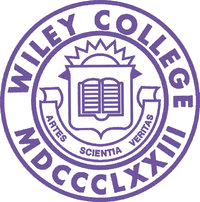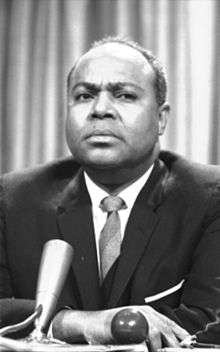Wiley College
Wiley College is a private, historically black, liberal arts college in Marshall, Texas. Founded in 1873 by the Methodist Episcopal Church's Bishop Isaac Wiley and certified in 1882 by the Freedman's Aid Society, it is one of the oldest predominantly black colleges west of the Mississippi River.[2][3]
 | |
| Motto | Go Forth Inspired |
|---|---|
| Type | Private liberal arts college HBCU |
| Established | 1879 |
Religious affiliation | United Methodist Church |
| Endowment | $27 million |
| President | Herman J. Felton, Jr. |
| Students | 1,400 |
| Location | , , United States |
| Campus | Rural, 134 acres (0.5 km2) |
| Colors | Purple and white |
| Athletics | NAIA – RRAC |
| Nickname | Wildcats |
| Affiliations | UNCF IAMSCU CIC[1] |
| Sports | 10 varsity sports teams |
| Mascot | Wiley the Wildcat |
| Website | www.wileyc.edu |
 | |
In 2005–2006, on-campus enrollment approached 450, while an off-campus program in Shreveport, Louisiana, for students with some prior college credits who seek to finish a degree, enrolled about 250. As of the fall of 2006, total enrollment was about 750. By fall of 2013, total enrollment was approximately 1,400. Wiley is an open admissions college and about 96 percent of students receive some financial aid.[4]
Over a 15-year period, Melvin B. Tolson's debate teams lost only one of 75 debates. Wiley's debate team competed against historically black colleges and earned national attention with its 1935 debate against University of Southern California's highly ranked debate team.[5]
Academics
Wiley College offers bachelor's degrees through four academic divisions.[6]
- Division of Education
- Division of Social Sciences & Humanities
- Division of Business & Technology
- Division of Sciences
Civil Rights Movement
Wiley, along with Bishop College, was instrumental in the Civil Rights Movement in Texas. Wiley and Bishop students launched the first sit-ins in Texas in the rotunda of the Old Harrison County Courthouse to protest segregation in public facilities.
James L. Farmer, Jr., son of James L. Farmer, Sr., graduated from Wiley and became one of the "Big Four" of the Civil Rights Movement. Together with Roy Wilkins, Rev. Dr. Martin Luther King Jr., and Whitney M. Young Jr., James L. Farmer, Jr. helped organize the first sit-ins and Freedom Rides in the United States.[7][8]
Debate team
Tony Scherman's article about the Wiley College debate team for the 1997 Spring issue of American Legacy sparked a renewed interest in its history.[9] The success of the 1935 Wiley College debate team, coached by professor and poet Melvin Tolson, was the subject of a 2005 AMS Pictures documentary, The Great Debaters, The Real Great Debaters of Wiley College, which received heavy play around Texas, followed by 2007 dramatic movie, The Great Debaters, directed by and starring Denzel Washington. In 1935, the Wiley College debate team defeated the reigning national debate champion, the University of Southern California (depicted as Harvard University in The Great Debaters).
In 2007, Denzel Washington announced a donation of $1 million to Wiley so the team could be re-established.[10][11]
The Wiley College Debate Team, now also known as the Melvin B. Tolson/Denzel Washington Forensics Society of Wiley College, is under the direction of Dr. Courtney J. Wright. The purpose of The Wiley College Debate Team is not only to compete at a national and regional level, but also to instill a strong work ethic, a drive for academic excellence, and a spirit of ethical competition in its student leaders.[12]
The Wiley College debate team earned the mantle, "The Great Debaters," the name was bestowed on the team by director-actor Denzel Washington in a movie by the same name which premiered in 2008. The 23-person team met the best speakers and debaters from 80 colleges and universities sent by 26 states to the Pi Kappa Delta Comprehensive National Tournament staged in Indianapolis, Indiana. This was the largest Pi Kappa Delta Tournament in their 101-year history. The Great Debaters came away in first place. When the winning totals from the debates and individual events – 2000 entries in all – Wiley College was named champion.
The victory holds special meaning for the Historically Black College. Not only was it the first national speech and debate title won by an HBCU, another moral victory was won. During Melvin B. Tolson's tenure, Wiley College had not been permitted to join the national forensics fraternity, Pi Kappa Delta, or to participate in its national convention or national championship.
In 2017, Wiley College led the establishment of the first HBCU National Speech and Debate League.[13] In 2018, Wiley hosted the first HBCU National Speech and Debate League Tournament.[14]
Athletics
Wiley College teams, nicknamed the Wildcats, are part of the National Association of Intercollegiate Athletics (NAIA), primarily competing in the Red River Athletic Conference (RRAC). Men's sports include baseball, basketball, cross country, soccer, and track & field. Women's sports include basketball, cross country, soccer, track & field, volleyball, and cheerleading. Wiley the Wildcat is the mascot.
Gallery
- Thirkield Hall at Wiley College in Marshall, Texas
- Thomas Cole Winston, Sr., Library at Wiley College
- Julius S. Scott, Sr. Chapel at Wiley College
- Aaron Baker Science Building at Wiley College
- H.B. Pemberton Heritage Center at Wiley College
- The Fred Thomas Long Student Union building at Wiley College
Notable people
Notable faculty
| Name | Department | Notability | Reference |
|---|---|---|---|
| Melvin B. Tolson | English | Noted poet and English professor | [15] |
| James L. Farmer, Sr. | First black Texan to earn a PhD, also a professor at Wiley | ||
| Fred T. Long | Athletics | Athletic director and head football coach | [16] |
| Harry Long | Biology | Head of biology department and asst. football coach | [17] |
Notable alumni

| Name | Class year | Notability | Reference(s) |
|---|---|---|---|
| R. E. Brown | 1899 | Organized the first male quartet, first brass band, first football team at Wiley. Later started the first teacher-training school for African Americans in Louisiana. | [18] |
| Ernest Lyon | Minister, former United States Ambassador to Liberia, and founder of the Maryland Industrial and Agricultural Institute for Colored Youths. | ||
| Lois Towles | 1933 | Internationally renowned concert pianist. | [19] |
| Henrietta Bell Wells | First female member of the debate team subject of the 2007 movie, "The Great Debaters" | [20] | |
| Thelma Dewitty | 1941 | First African American to teach in the Seattle Public Schools | [21] |
| James L. Farmer, Jr. | 1938 | U.S. civil rights leader | [22] |
| Richard E. Holmes | Physician, transferred to Mississippi State University after sophomore year at Wiley to be the first African American to matriculate at MSU | [23] | |
| Conrad O. Johnson | Music educator | [24] | |
| Henry Cecil McBay | Chemist, college professor | ||
| Willie Pearson Jr | 1968 | Sociologist, college professor, author | |
| Oliver Randolph | 1904 | New Jersey lawyer, politician, and civil rights advocate | [25] |
| Bill Spiller | African-American golfer who challenged the segregationist policies of the PGA | [26] | |
| Heman Marion Sweatt | Plaintiff in U.S. Supreme Court case, Sweatt v. Painter (1950); helped to found Texas Southern University | ||
| Lee Wilder Thomas | Prominent African-American businessman in the oil industry | ||
| James Wheaton | 1945 | Actor, director, educator | [27] |
| Richard Williams | Jazz trumpeter | ||
| Mike Lewis | 1980 | NFL | |
| C. O. Simpkins, Sr. | Member of the Louisiana House of Representatives, 1992-1996; retired Shreveport dentist | [28] |
References
- "Members of CIC: Texas". cic.edu.
- "Wiley College (1873- ) - The Black Past: Remembered and Reclaimed". Retrieved March 21, 2016.
- "Archived copy". Archived from the original on 2009-01-30. Retrieved 2009-04-11.CS1 maint: archived copy as title (link)
- http://www.humanitiestexas.org/news/articles/wiley-colleges-great-debaters
- http://www.wileyc.edu/academics-office
- "James Farmer Memorial Page". Retrieved March 21, 2016.
- BlackNews.com – American Legacy Magazine's Story: The Great Debaters, Turns from Pages to the Big Screen Directed By and Starring Denzel Washington and Produced By Oprah Winfrey
- "Wiley College". Retrieved March 21, 2016.
- Wiley College – A Place Where Every Student Can Succeed, Dallas News
- Forensic Society Debaters of Wiley College
- http://www.wileyc.edu/article/122.php
- http://www.wileyc.edu/article/143.php
- "Marshall Texas Directory". 1946. Retrieved October 19, 2009.
- The Decatur Review Long obituary March 24, 1966 page 13
- The Chicago Defender "Wiley Coach Drops Dead in Football Classic" December 15, 1945 pages 1 & 5 and The Chicago Defender "Harry Long Joins Wiley Grid Staff" July 13, 1929 page 9
- "Wiley Graduate of 1899 to be Honored with Citation". The Wiley Reporter. Marshall, Texas: Wiley College. May 1953. p. 1.
Dr. Brown, the oldest living graduate of Wiley, entered the institution on his sixteenth birthday and finished in the class of 1899 at the age of twenty-four.
- Dogan Teycer, Lucile (May 1953). "Lois Towles in Wiley Concert". The Wiley Reporter. Marshall, Texas: Wiley College. p. 1.
Students and friends of Wiley were thrilled by the superb concert of the internationally famous pianist, Lois Towles.
- Martin, Douglas (March 12, 2008). "Henrietta Bell Wells female member of Wiley College debate team". The New York Times. Retrieved January 24, 2011.
- Mary T. Henry, Dewitty, Thelma (1912–1977) Archived 2011-07-26 at the Wayback Machine, HistoryLink, November 10, 1998. Accessed online September 30, 2008.
- "James Farmer Biography: Greensboro Voices". Retrieved January 4, 2008.
- Hearn, Phil. "Richard Holmes became MSU's first black student 40 years ago". Mississippi State University. Retrieved 1 November 2017.
- "Conrad O. Johnson: Hall of Fame profile". Retrieved January 4, 2008.
- "Oliver Randolph". The New York Times. 1951-09-03. p. 13. Retrieved 2016-09-21.
- "One man's mission". ESPN.com. Retrieved March 21, 2016.
- James Wheaton on IMDb
- "C. O. Simpkins, Sr.: Civil Rights Champion". cosimpkins.com. Retrieved September 1, 2015.